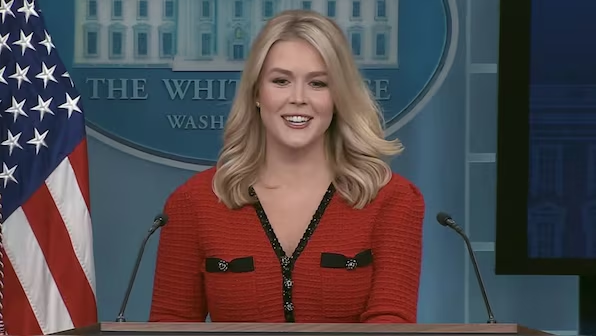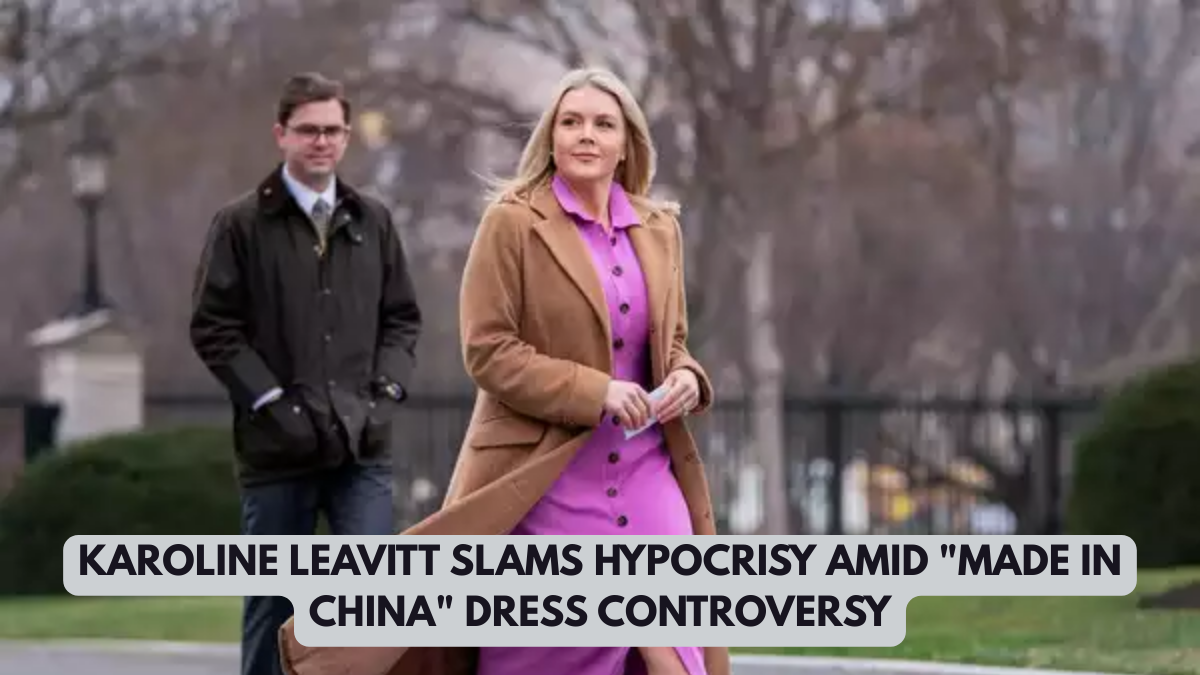Karoline Leavitt, a prominent political figure and former White House press secretary, found herself in the spotlight once again, but this time, for an incident involving a dress labeled as “Made in China.” The controversy, which sparked a wave of debate across social media, quickly escalated after a Chinese diplomat allegedly trolled Leavitt for wearing attire linked to a nation she has fiercely criticized.
Background on Karoline Leavitt’s Political Stance
Karoline Leavitt, a Republican candidate, made waves in the political arena during her run for Congress in 2022, positioning herself as one of the youngest U.S. congressional nominees in history. A staunch critic of the Chinese Communist Party (CCP), Leavitt has consistently highlighted the Chinese government’s alleged influence-peddling and corruption within U.S. politics. Throughout her political career, Leavitt has spoken out against what she perceives as the dangers posed by China’s growing influence on global politics.
In particular, she has focused on the Communist Party’s efforts to silence critics and its alleged interference in American politics, framing China as a serious national security threat to the United States. Her firm stance on China is reflected in her campaign messages, speeches, and statements on social media, where she frequently warns about the economic and political dangers China poses to American sovereignty.
The Dress Controversy: A Hypocritical Fashion Statement?

The controversy erupted when Leavitt was spotted wearing a dress that bore the “Made in China” label. The dress, which was part of a high-profile public appearance, quickly became the subject of online ridicule. Critics pointed out the irony of Leavitt—who has been vocal about her anti-China stance—wearing an article of clothing manufactured in the very country she has repeatedly condemned.
To make matters worse, the situation took an unexpected turn when a Chinese diplomat apparently seized the opportunity to troll Leavitt on social media. In a post that seemed to mock Leavitt’s outspoken criticism of China, the diplomat made light of the situation, poking fun at the “hypocrisy” of the politician’s attire. This only fueled the controversy, with many social media users quick to jump on both sides of the debate, arguing over whether Leavitt’s fashion choice undermined her credibility or whether the situation was being blown out of proportion.
A Deep Dive Into the Irony of the Moment
While many found the situation amusing, others criticized it as a moment of political irony. As a politician, Leavitt has made clear her disdain for China’s influence on global markets, even going so far as to advocate for the U.S. to decouple its economy from China’s. Her political messages have centered around securing American jobs, promoting domestic manufacturing, and cracking down on foreign influence in American policy-making.
However, the reality of the global economy makes it difficult for even the most ardent critics of China to fully escape its impact. China remains a dominant force in global trade, and its manufacturing sector is responsible for producing a vast majority of the goods consumed worldwide. This means that even individuals who vocally oppose China’s actions may find themselves, intentionally or unintentionally, wearing products made in China. The irony is particularly sharp for those like Leavitt, who have criticized China for its alleged economic manipulations and human rights abuses, only to be caught in a situation where they are directly connected to the country’s economic machinery.
The Diplomatic Trolling: A Strategic Move?
The involvement of a Chinese diplomat in this situation is noteworthy. While the diplomat’s comments could be seen as playful trolling, some observers have suggested that it was a calculated attempt to embarrass Leavitt and undermine her credibility. Given the rising tensions between the U.S. and China, the incident could be seen as an example of how even seemingly trivial matters—like the origin of a dress—can be weaponized in the ongoing war of narratives between the two countries.
The diplomatic response could also be a reflection of the broader challenges that U.S. policymakers face in their interactions with China. As tensions over trade, intellectual property, and human rights continue to grow, small missteps or perceived contradictions can quickly become political fodder. In a hyper-polarized political environment, these issues can quickly take on greater significance than they might otherwise deserve.
The Bigger Picture: Made in China vs. American Values
Beyond the specific incident with Leavitt, the broader issue at play here is the increasing difficulty for Americans to escape the reality of global manufacturing. The U.S. has been heavily dependent on Chinese imports for decades, and China remains one of the largest producers of goods in virtually every category, from electronics to clothing.
This creates a fundamental tension between American political leaders who want to promote economic independence and those who acknowledge the reality of a globalized market. The “Made in China” label is a stark reminder of the interconnectedness of the global economy and serves as a symbol of the challenges facing American policymakers as they navigate the complexities of trade relations with China.
Conclusion: The Irony of Global Trade

In the end, the “Made in China” dress controversy surrounding Karoline Leavitt is a momentary distraction in the broader political discourse. It highlights the inherent contradictions in a world where political rhetoric, global trade, and personal actions are often at odds. Leavitt’s critics may see the situation as hypocritical, but the reality is that the global economy is much more complicated than simple ideological positions can address.
Leavitt may have made a fashion misstep, but it’s important to remember that her broader political platform is shaped by her views on China’s role in the world. The dress may have been “Made in China,” but Leavitt’s policies aim to ensure that America’s future is made in the USA.
For more information on U.S.-China relations and the impact of global trade, visit official government sources like the U.S. Department of State (State.gov) and the Office of the U.S. Trade Representative (USTR.gov).


